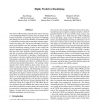Free Online Productivity Tools
i2Speak
i2Symbol
i2OCR
iTex2Img
iWeb2Print
iWeb2Shot
i2Type
iPdf2Split
iPdf2Merge
i2Bopomofo
i2Arabic
i2Style
i2Image
i2PDF
iLatex2Rtf
Sci2ools
104
Voted
USS
2008
2008
Highly Predictive Blacklisting
The notion of blacklisting communication sources has been a well-established defensive measure since the origins of the Internet community. In particular, the practice of compiling and sharing lists of the worst offenders of unwanted traffic is a blacklisting strategy that has remained virtually unquestioned over many years. But do the individuals who incorporate such blacklists into their perimeter defenses benefit from the blacklisting contents as much as they could from other list-generation strategies? In this paper, we will argue that there exist better alternative blacklist generation strategies that can produce higher-quality results for an individual network. In particular, we introduce a blacklisting system based on a relevance ranking scheme borrowed from the link-analysis community. The system produces customized blacklists for individuals who choose to contribute data to a centralized log-sharing infrastructure. The ranking scheme measures how closely related an attack sou...
Related Content
| Added | 02 Oct 2010 |
| Updated | 02 Oct 2010 |
| Type | Conference |
| Year | 2008 |
| Where | USS |
| Authors | Jian Zhang, Phillip A. Porras, Johannes Ullrich |
Comments (0)

